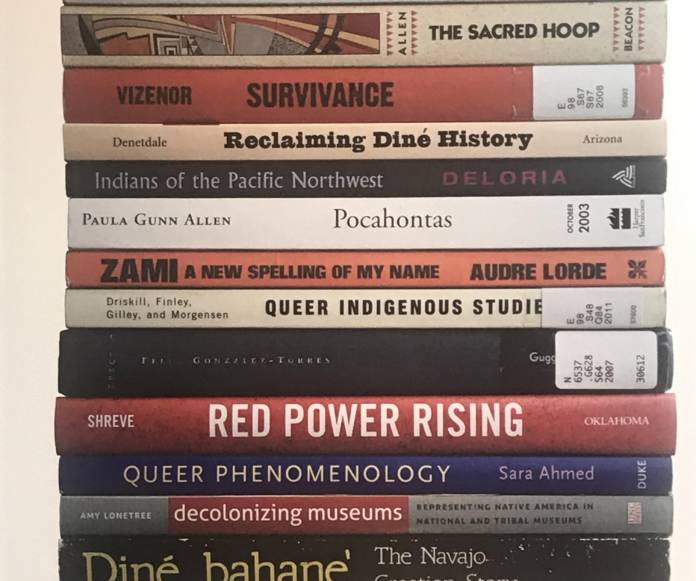When he was 13, PJ Gubatina Policarpio moved from the Philippines to San Francisco’s Excelsior District. As a student at Balboa High School, he encountered authors like Toni Morrison, Leslie Marmon Silko, Sandra Cisneros, and Jessica Hagedorn. Reading these authors influenced Policarpio, and he thinks seeing himself and people he knew reflected in what he was studying, made him a more engaged and diligent student.
When he moved to New York, Policarpio realized that not everyone had had gotten the exposure to these works he had.
“My education about the United States and what America is kind of shaped by my education here in San Francisco,” he said. “That was the way I saw things, and my world views were shaped by this education. I would say it was a really relevant and self-determined education.”
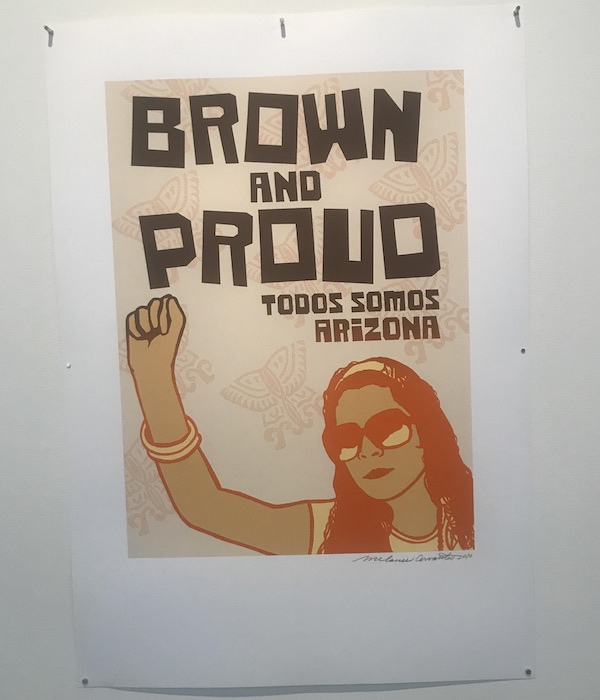
Policarpio thinks a big reason he read these books in high school classes was due to the first College of Ethnic Studies that began at San Francisco State University 50 years ago, influencing the curriculum at Balboa and around the nation. The college was established after students, professors and community members fought for months to have diverse voices reflected in higher education.
To commemorate this milestone anniversary, Policarpio curated the show Solidarity Struggle Victory at Southern Exposure with works by artists Sadie Barnette, Demian DinéYazhi’, Patrick Martinez, Dylan Miner, Kameelah Janan Rasheed, Dignidad Rebelde, and Jerome Reyes.
“This revolutionary organization of curriculum started here in the Bay area, but isn’t widely known,” he said. “We know about the Black Panther and Black Panther and other movements, but this still isn’t readily available, this history.”
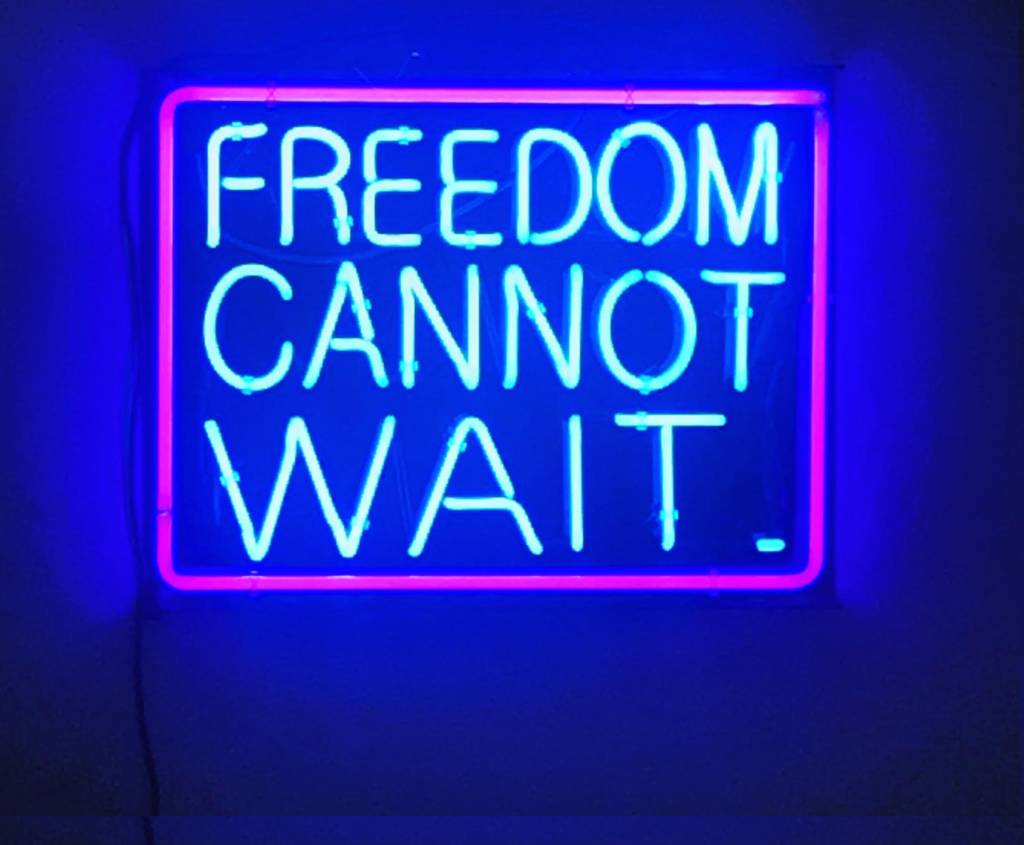
On a recent afternoon, one of the artists, DinéYazhi´, visited the gallery from Portland, and Policarpio gave a brief tour of the exhibit.
It starts with a neon sign from Martinez reading “No Struggle No Progress” that can be seen through the window from Alabama Street in front of the gallery. Policarpio said he loved the quote, part of a longer one from a speech by Frederick Douglas. The sentence reads: “If there is no struggle there is no progress. Those who profess to favor freedom and yet deprecate agitation are men who want crops without plowing up the ground; they want rain without thunder and lightning. They want the ocean without the awful roar of its many waters.”
“I really wanted something to kind of bring in people from the streets,” Policarpio said. “I wanted to think about this cyclical nature of struggle and progress.”
Policarpio feels a felt banner of Miner’s reading “Meet You Here,” creates a sort of meeting space whereas the nearby Reyes’ drawing of the San Francisco State quad, where protestors gathered when fighting for the Ethnic Studies program, is a sort of rest. The drawing, in mostly greys and muted blues with no figures, seems timeless, Policarpio thinks.
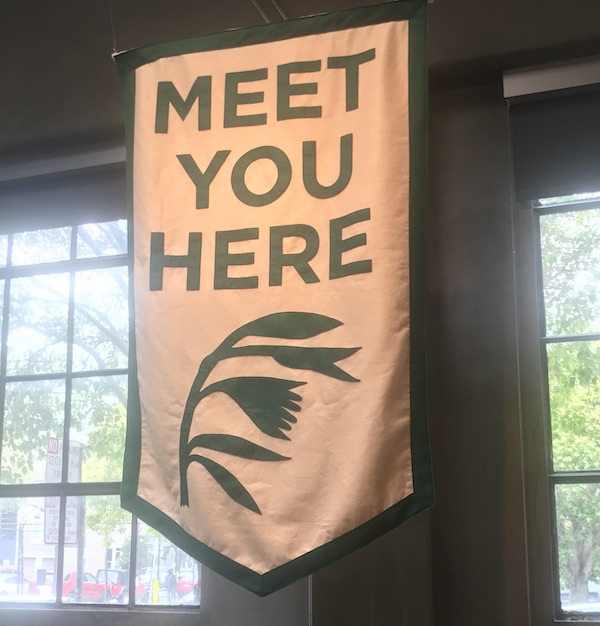
“It has a kind of transcendent feel,” he said. “The colors are so different than the rest of the artworks that it’s kind of a quiet anchor.”
Silk-screened posters by the Oakland collective Dignidad Rebelde (Melanie Cervantes and Jesus Barranza) hang on the wall including ones about Alcatraz, Black Lives Matter, and Standing Rock.
“What I love about this kind of printing is the visual history of all these movements that have happened in the Bay Area,” he said. “It’s a visual time capsule of the Bay Area’s concerns.”
DinéYazhi´, who founded the Indigenous artist/activist initiative, R.I.S.E.: Radical Indigenous Survivance & Empowerment, has recently exhibited at Honolulu Biennial, Whitney Museum of American Art, and the Henry Art Gallery. They talked about a series of poetry zines, Survivance.
The idea came from Anishinaabe scholar Gerald Vizenor—a mixture of survival and endurance. Oral storytelling is an active instance of survivance, DinéYazhi´ says, and not going with a conventional press for the zines allows them to avoid romanticizing indigenous culture.
“I think this whole mindset of the Indian who speaks with nature or is at one with nature—that’s just as damaging as the legacy of the drunken Indian,” they said.
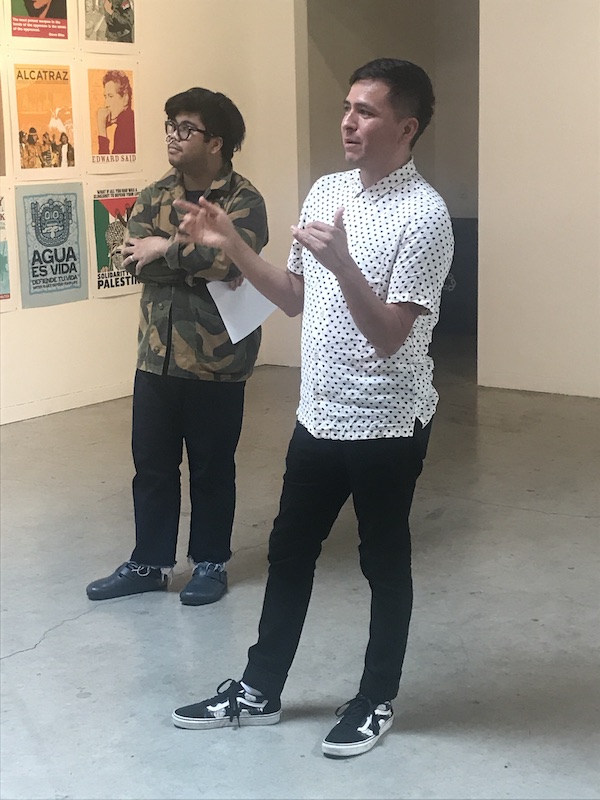
Along with the zines, a piece of DinéYazhi´’s hangs on the wall, “Untitled (Radical Indigenous Queer Feminist Bibliography),” a photo montage of a stack of books, including the titles Red Power Rising, Decolonizing Museums, and Engaged Resistance.
“It was important for me to help the viewer understand that my ideas about queerness and ideas about feminism are all influenced by a radical indigenous perspective,” they said. “I was interested in how a bibliography creates access for people, and people who aren’t inside of institutions oftentimes don’t have access to bibliographies. So it was a way for me to give away a bibliography.”
SOLIDARITY STRUGGLE VICTORY
Through November 9
Southern Exposure
More information here


